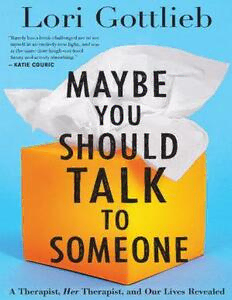
Maybe You Should Talk to Someone: A Therapist, Her Therapist, and Our Lives Revealed PDF
Preview Maybe You Should Talk to Someone: A Therapist, Her Therapist, and Our Lives Revealed
Contents Title Page Contents Copyright Epigraph Author’s Note Part One Idiots If the Queen Had Balls The Space of a Step The Smart One or the Hot One Namast’ay in Bed Finding Wendell The Beginning of Knowing Rosie Snapshots of Ourselves The Future Is Also the Present Goodbye, Hollywood Welcome to Holland How Kids Deal with Grief Harold and Maude Hold the Mayo The Whole Package Without Memory or Desire Part Two Fridays at Four What We Dream Of The First Confession Therapy with a Condom On Jail Trader Joe’s Hello, Family The UPS Guy Embarrassing Public Encounters Wendell’s Mother Addicted The Rapist On the Clock Part Three My Wandering Uterus Emergency Session Karma Just Be Would You Rather? The Speed of Want Ultimate Concerns Legoland How Humans Change Fathers Integrity Versus Despair My Neshama What Not to Say to a Dying Person Boyfriend’s Email Wendell’s Beard Part Four The Bees Kenya Psychological Immune System Counseling Versus Therapy Deathzilla Dear Myron Mothers The Hug Don’t Blow It It’s My Party and You’ll Cry if You Want To Happiness Is Sometimes Wendell A Pause in the Conversation Acknowledgments About the Author Connect with HMH Copyright © 2019 by Lori Gottlieb All rights reserved For information about permission to reproduce selections from this book, write to [email protected] or to Permissions, Houghton Mifflin Harcourt Publishing Company, 3 Park Avenue, 19th Floor, New York, New York 10016. hmhbooks.com Library of Congress Cataloging-in-Publication Data Names: Gottlieb, Lori, author. Title: Maybe you should talk to someone : a therapist, HER therapist, and our lives revealed / Lori Gottlieb. Description: Boston : Houghton Mifflin Harcourt, 2019. Identifiers: LCCN 2018042562 (print) | LCCN 2018045914 (ebook) | ISBN 9781328663047 (ebook) | ISBN 9781328662057 (hardback) Subjects: LCSH: Gottlieb, Lori,—Health. | Psychotherapists—Biography. | Therapist and patient— Biography. | BISAC: PSYCHOLOGY / Psychotherapy / General. | BIOGRAPHY & AUTOBIOGRAPHY / Personal Memoirs. | SELF-HELP / Personal Growth / Happiness. | FAMILY & RELATIONSHIPS /Love & Romance. Classification: LCC RC480.8 (ebook) | LCC RC480.8 .G68 2019 (print) | DDC 616.89/14092 [B]—dc23 LC record available at https://lccn.loc.gov/2018042562 Cover design by Martha Kennedy Hand lettering © Gill Heeley Cover photograph © hatman12 / iStock / Getty Images Plus Author photograph © Shlomit Levy Bard v1.0319 Illustrations on page 42 copyright © 2019 by Arthur Mount. Emoji art on page 49, from left to right: Standard Studio via Shutterstock; Sovenko Artem via Shutterstock; Park Ji Sun via Shutterstock; Rvector via Shutterstock. “Welcome to Holland,” copyright © 1987 by Emily Perl Kingsley. Reprinted by the permission of the author. All rights reserved. It is proposed that happiness be classified as a psychiatric disorder and be included in future editions of the major diagnostic manuals under the new name: major affective disorder, pleasant type. In a review of the relevant literature it is shown that happiness is statistically abnormal, consists of a discrete cluster of symptoms, is associated with a range of cognitive abnormalities, and probably reflects the abnormal functioning of the central nervous system. One possible objection to this proposal remains—that happiness is not negatively valued. However, this objection is dismissed as scientifically irrelevant. —RICHARD BENTALL, JOURNAL OF MEDICAL ETHICS, 1992 The eminent Swiss psychiatrist Carl Jung said this: “People will do anything, no matter how absurd, to avoid facing their own souls.” But he also said this: “Who looks inside, awakes.” Author’s Note This is a book that asks, “How do we change?” and answers with “In relation to others.” The relationships I write about here, between therapists and patients, require a sacred trust for any change to occur. In addition to attaining written permission, I have gone to great lengths to disguise identities and any recognizable details, and in some instances, material and scenarios from a few patients have been attributed to one. All changes were carefully considered and painstakingly chosen to remain true to the spirit of each story while also serving the greater goal: to reveal our shared humanity so that we can see ourselves more clearly. Which is to say, if you see yourself in these pages, it’s both coincidental and intentional. A note on terminology: Those who come to therapy are referred to in various ways, most commonly as patients or clients. I don’t believe that either word quite captures the relationship I have with the people I work with. But the people I work with is awkward, and clients might be confusing, given that term’s many connotations, so for simplicity and clarity, I use patients throughout this book. Part One Nothing is more desirable than to be released from an affliction, but nothing is more frightening than to be divested of a crutch. —James Baldwin
